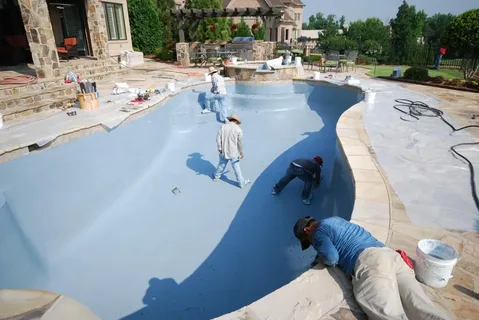A swimming pool is a great addition to any home or commercial property, providing relaxation, entertainment, and a place to cool off on hot days. However, like any other structure, pools require regular maintenance and occasional repairs to stay in optimal condition. Cracks, leaks, pump malfunctions, and filtration issues can compromise the cleanliness, safety, and functionality of your pool. This guide covers common pool problems, repair solutions, maintenance tips, and how to choose the right professional pool repair service.
Common Pool Problems That Require Repairs
Understanding the most common pool issues can help you identify and address problems before they worsen. Here are some typical pool repair needs:
1. Pool Leaks
Pool leaks can occur due to cracks in the pool shell, plumbing issues, or faulty seals. Signs of a leak include:
- Unexplained water loss
- Wet spots around the pool area
- Higher-than-normal water bills
Repair Solution: A professional pool repair specialist can detect leaks using pressure tests and electronic leak detection. Fixing leaks may involve sealing cracks, replacing damaged pipes, or reapplying waterproof coatings.
2. Cracks and Structural Damage
Cracks can develop in concrete, fiberglass, and vinyl pools due to ground shifting, improper installation, or aging materials.
Repair Solution: Small cracks can be patched, while larger structural damage may require resurfacing or complete replastering. In severe cases, professional reinforcement might be needed.
3. Pump and Motor Issues
The pool pump and motor are crucial for water circulation and filtration. Common problems include:
- Strange noises from the pump
- Reduced water circulation
- Pump not turning on
Repair Solution: Issues with the motor, impeller, or seals may require part replacement or lubrication. In some cases, an entirely new pump may be necessary.
4. Filtration System Malfunctions
A pool’s filtration system removes dirt, debris, and contaminants from the water. When it fails, water can become cloudy, unclean, or unsafe.
Repair Solution: Fixing a filtration issue may involve replacing filter cartridges, repairing backwash valves, or upgrading to a more efficient filtration system.
5. Tile and Coping Damage
Pool tiles and coping enhance the aesthetic appeal and structural integrity of the pool. Over time, they can become loose, chipped, or discolored.
Repair Solution: Damaged tiles and coping should be replaced or resealed to prevent water penetration and further deterioration.
6. Heater Malfunctions
A broken pool heater can make swimming uncomfortable, especially in cooler climates.
Repair Solution: Troubleshooting may involve checking for clogged burners, electrical issues, or malfunctioning thermostats. Replacing faulty components may restore proper heating.
7. Chemical Imbalance and Algae Growth
Incorrect chemical levels can lead to algae growth, cloudy water, or skin irritation.
Repair Solution: Regular water testing and chemical balancing ensure a safe swimming environment. Shocking the pool and using algaecides can eliminate algae infestations.
Pool Maintenance Tips to Avoid Costly Repairs
While professional repairs are sometimes unavoidable, regular maintenance can extend the life of your pool and prevent expensive issues. Follow these best practices:
1. Regular Water Testing
Check pH, chlorine, alkalinity, and calcium levels weekly to maintain proper water balance.
2. Skimming and Vacuuming
Remove leaves, debris, and dirt from the water surface and bottom using a skimmer net and pool vacuum.
3. Inspect Pool Equipment
Check the pump, filter, and heater for signs of wear and tear to ensure smooth operation.
4. Brush Pool Walls and Tiles
Prevent algae and calcium buildup by brushing the walls and tiles at least once a week.
5. Monitor Water Levels
Keep water levels consistent to avoid strain on the pump and filtration system.
6. Schedule Professional Inspections
Annual inspections by pool repair experts can catch minor issues before they escalate into major problems.
Choosing the Right Pool Repair Service
Selecting a qualified pool repair service ensures quality workmanship and long-lasting results. Consider these factors when hiring a professional:
1. Experience and Certifications
Look for technicians with industry certifications, licenses, and years of experience in pool repairs.
2. Customer Reviews and Reputation
Check online reviews and ask for references to ensure the company has a solid track record.
3. Comprehensive Services
Choose a service provider that offers a wide range of repair and maintenance solutions, from leak detection to equipment replacement.
4. Upfront Pricing and Warranty
A reputable company provides transparent pricing and warranties on repairs and parts.
5. Emergency Repair Services
Pool issues can arise unexpectedly. Hiring a company that offers emergency services ensures timely repairs when needed.
Conclusion
Maintaining a clean, safe, and functional pool requires attention to detail and timely repairs. Common issues like leaks, pump failures, and structural damage can be resolved with professional intervention, while regular maintenance prevents costly damage. By investing in expert pool repair services, you can enjoy a well-maintained swimming pool for years to come.
Whether you own a residential or commercial pool, staying proactive with repairs and upkeep ensures a safe and enjoyable swimming experience. If you notice any issues with your pool, don’t delay—contact a professional pool repair service today to restore your pool’s functionality and beauty.


